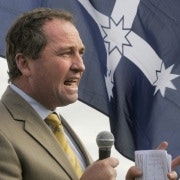A new low for COAG's poisoned partisanship
Crikey
As we saw during the Rudd years, even when partisanship is absent, COAG is a barely functional mechanism for reforms in the national interest.
Who can forget John Brumby, despite a bribe of a $1 billion from the Commonwealth, setting out to wreck water market reforms – a decision that continues to stymie a crucial micro-economic reform to this day? It was Kevin Rudd versus self-interest, and self-interest outsmarted him comprehensively. So much for the alleged benefits of an all-Labor COAG.
But when partisanship is in the air, COAG grinds to a halt. It basically shut down in 2006-07 when John Howard and what eventually became a full slate of Labor premiers refused to work together, even on matters they agreed on. It was a huge missed opportunity, because at that point Steve Bracks was trying to drive an immensely valuable set of reforms in areas like "human capital”.
But rarely has dysfunction looked so pitiful and petty as it did yesterday when Liberal premiers preferred to delay trials for the National Disability Insurance Scheme rather than be seen to give Julia Gillard a win. The interests of disabled Australians and their carers – and ultimately our dignity as a nation in the way we treat those less fortunate that most of us – came a distant second to partisanship.
It's all so unnecessary. Gillard is politically terminal. Either her party will dispatch her or voters will, and the latter will do it with rather more prejudice than the former. No amount of COAG wins is going to revive her political fortunes. But nonetheless, the likes of Barry O'Farrell and Ted Baillieu evidently believe only in disability reforms delivered by Tony Abbott, not Gillard. Rather like the federal opposition claiming it will give business a tax cut, but insisting on blocking Labor's tax cut.
Then there's Campbell "Spanish bombs” Newman insisting he can't contribute because he's inherited a European-style financial mess. He better hope credit agencies don't take him at his word and slash the AA credit rating he inherited from Labor.
Colin Barnett, at least, has been a consistent dog in the manger on the NDIS, right from the get-go. His refusal to agree was predictable. But it was only last August that Ted Baillieu declared that it was "now up to governments across Australia to use the good work done by the Productivity Commission to make an NDIS a workable, sustainable reality".
Well, not so much if Labor might derive the faintest advantage from it.
The intensity of partisanship has skewed media coverage as well. Leigh Sales' interview with the prime minister on 7.30 was jaw-dropping last night for several reasons but most astonishing was her suggestion the failure was the prime minister's fault because she hadn't put enough money on the table and should, in effect, have paid entirely for the scheme trials.
A reflexive insistence that both sides of politics are to blame when one side is engaging in bloody-mindedness is a disease plaguing US mainstream media political coverage. As we enter the final year of the government's term and partisan rancour comes to dominate even more than it currently does, it presumably will become a feature of our media environment as well. Balance without judgment.
More broadly, the outcome raises the question of exactly how COAG can ever become an effective reform vehicle. COAG only works with first ministers who have a genuine sense of the national interest in addition to their own narrow political interests. That existed sporadically in the early 1990s when Bob Hawke first began working with premiers such as Nick Greiner and Wayne Goss, before COAG was officially established (for his pains, Hawke saw Paul Keating undermine him using the inter-governmental process). It's flickered to life occasionally since then, but now that idea now seems a quaint relic of another era. Perhaps an all-Liberal COAG would be more effective at achieving results. But as the Rudd experience demonstrated, don't count on it.
Meanwhile, disabled Australians continue to wait.
This story first appeared on www.crikey.com.au on July 26. Republished with permission.













